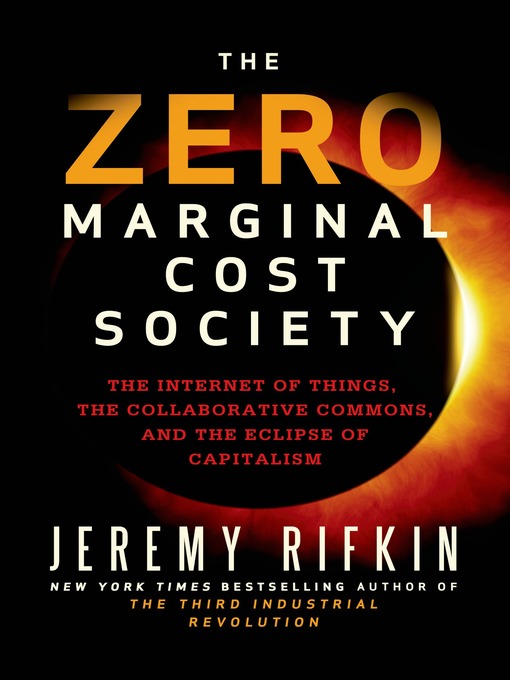
The Zero Marginal Cost Society
The Internet of Things, the Collaborative Commons, and the Eclipse of Capitalism
کتاب های مرتبط
- اطلاعات
- نقد و بررسی
- دیدگاه کاربران
نقد و بررسی

February 24, 2014
The Internet is lowering marginal production costs to nearly zero, futurist Rifkin (The Third Industrial Revolution) declares, making once prohibitively expensive items, services, and activities almost free. Rifkin suggests that scarcity will give way to a future of abundance as humankind learns to share in a “collaborative commons,” thus weakening profits and property rights. “The capitalist era is passing,” he begins grandly, and it “will transform our way of life.” To make his case, Rifkind explores 3-D printing, massive open online courses (MOOCs), green energy, and other micro cases. But all this does not add up to plausible proof for his expansive claims. Rifkin’s rambling, wildly optimistic polemic revisits the proposition that the Internet connects the world in novel ways—not an especially new claim. Stringing buzzwords together like Christmas lights, Rifkin concludes that “the rise of the collaborative commons offers us a path to biosphere consciousness in an empathetic civilization” and a “sustainable cornucopia.” Rifkin’s speculative overreach, peppered with such cloying neologisms as “prosumers” and “homo empathicus,” may spoil the book for serious readers. Agent: Meg Thompson, Einstein Thompson Agency.

March 1, 2014
Rifkin (The Third Industrial Revolution: How Lateral Power Is Transforming Energy, the Economy, and the World, 2011, etc.) looks ahead to life after capitalism. The author argues that the Internet of Things, which links everyday objects (machines, businesses, residences, vehicles, etc.) in an intelligent network embedded in a single operating system, is paving the way for a new economy. The smart infrastructure provides a flow of big data to every business connected to the network, which they can then use to create predictive algorithms and automated systems to dramatically boost productivity and bring the marginal cost of producing many goods and services to nearly zero--making them nearly free. Offering many examples of cost-cutting made possible by the IoT in industries from health care to aviation, Rifkin writes that within two to three decades, consumers "will be producing and sharing green energy as well as physical goods and services, and learning in online virtual classrooms at near marginal cost, bringing the economy into an era of nearly free goods and services." In this economy of abundance, people will prefer to access services in a collaborative commons rather than exchange property in markets. Already, millions of people are sharing automobiles, bicycles, homes, clothes, tools, toys and skills in networked commons. Thus, IoT is taking us "from markets to networked commons, from ownership to access, from scarcity to abundance, and from capitalism to collaborationism." By midcentury, people will pursue nonmaterial shared interests; intelligent technology will do most of the work. In a scattershot narrative, Rifkin looks back to the origins of capitalism and ahead to an era of sharing and transparency typified by the younger generation's openness on social media. Whether unforeseen events or developments interfere with the neat future imagined here, the author gives a good sense of ongoing societal changes, such as 3-D printing, which promise enormous economic impacts. Intriguing but densely detailed and hyperbolic.
COPYRIGHT(2014) Kirkus Reviews, ALL RIGHTS RESERVED.

























دیدگاه کاربران